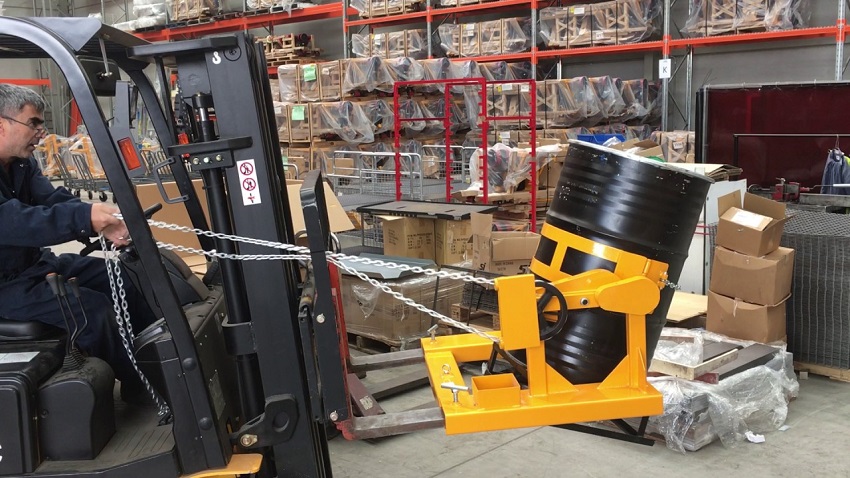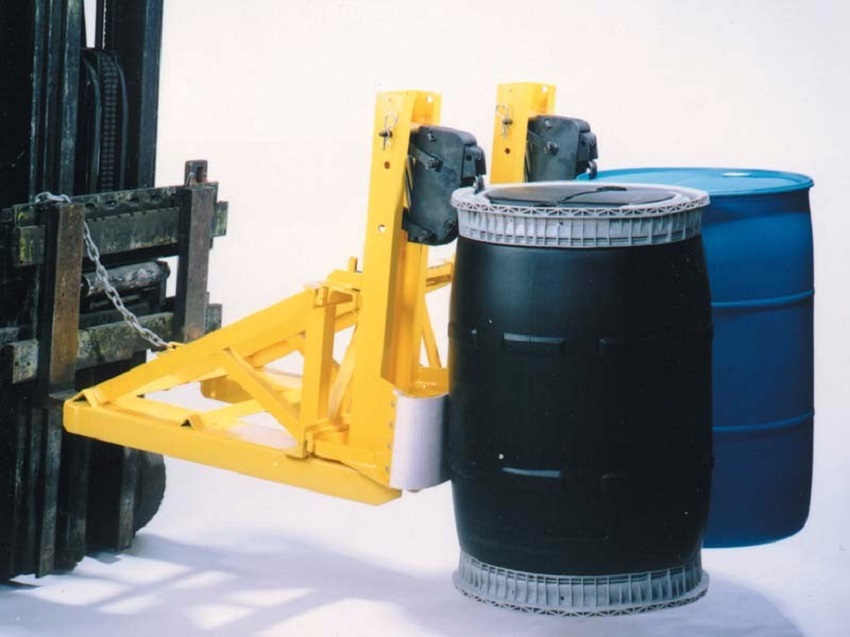We have seen a great deal of use of industrial drums over the last decades. One would expect that there is enough track record to learn from the common mistakes. Unfortunately, accidents due to improper manual handling of drums happen every day. This doesn’t only result in a waste of resources but also often contributes to injury in the workplace.
Broken limbs are the most common type of injury. They occur when drums (especially full drums) fall on an employee. Additionally, fingers can get trapped in between the drum and a pallet. And if the drums contain flammable or hazardous liquids, even worse injuries can happen.

source: reibus.com
And what is not as easy to spot is the multitude of musculoskeletal disorders that can be caused due to improper handling of materials. All of this, obviously reduces the morale among the warehouse workforce.
Can all this be avoided? The short answer is yes. The longer answer is that it takes proper equipment and safety awareness.
Contents
Get Proper Drum Handling Equipment & Attachments
If you are in the business of stocking barrels in your warehouse then you are already familiar with the fact that drum operations are pretty simple. You either want to lift them (to tip them/to move them) or you want to mix them. A forklift will serve you well if you equip it with a range of extensions that will make daily operations far safer. The umbrella term for them is drum handlers and they can be configured as drum movers, drum turners, drum lifters, palletizers, drum rollers etc.

source: ytimg.com
That being said, by investing in a set of heavy duty drum clamps for forklifts you can greatly increase the safety of drum handlers. They can be operated with electric or hydraulic assistance and are a great asset to get your employees out of harm’s way.
A drum lifter forklift attachment can be used to lift, transport and deposit steel drums. The driver doesn’t have to leave the driver’s seat to complete his task. You should look for welded steel construction that has a galvanized finish. It increases the service life of the drum clamp attachment so you can get your money’s worth.
Avoid Poor Drum Handling Practices
Now, there is no point in having the equipment if your staff is not properly trained on how to use it. So, you first need to make sure you relay the dangers of poor handling to the workers.
Make it abundantly clear that:
– Pushing or tipping a drum over to get it into horizontal position is an uncontrolled action to be avoided at all cost. Especially if the barrel is not completely full. Spillage of potentially flammable liquids can wreak great havoc in explosive atmospheres in the workplace.
– Moving a drum by manual churning to get it from point ‘A’ to point ‘B’ poses a great risk for injury. If the load is balanced on the bottom edge of the drum, the weight can be overwhelming and strain the body beyond its capacity.
– Use of excessive force to manually lift a drum to/from a pallet is very dangerous. Finger entrapment and strain injuries are not uncommon if you attempt to do this manually.
– Heavy drum handling is not safer if four of five workers are involved. Having two people tip the drum while one person is holding each side of the drum is an unsafe practice. This and similar methods are not to be used under any circumstances.
– Using a forklift without any drum handling attachment such as a drum grabber to lift a barrel in horizontal orientation is not safe. The drum can slide off each of the ends and either injure someone or spill the contents.

source: kokeinc.com
Clean Up the Work Place
Having the proper drum clamps for forklifts is not the only way to avoid injury. Take time to better organize your daily operations. You can start by eliminating uneven floors or rearranging cluttered spaces. Ensure the floors are not wet when crucial operations take place.
In addition to this, a well-lit space contributes to work safety. Establish ramps if needed to make sure the in-house traffic does not interfere with the operations. Last but not least, ensure every new staff member is briefed on the safety precautions they ought to take. During their training period don’t leave them to work unsupervised until they can safely assume their duties.
Run a Risk Assessment
If your company has a qualified work safety professional, ask them to run an audit of the processes. If you don’t have such a person in your human resources pool, then hire outside help. It will save you from headaches in the long run.
Every warehouse has a specific mechanism of operation. You might not need the whole range of drum handling equipment. Maybe you just need a drum trolley, but not a drum mixer. The safety professional can run an assessment and advise you on the exact type of drum handling equipment your warehouse lacks.
Use of PPE While Handling Drums
Having appropriate personal protective equipment can also alleviate many of the risks in any warehouse. Depending on the business you are in, there might be some specific risks you have to bear in mind. If your barrels are full of dangerous chemicals, your safety system has to be built around that. In terms of handling drums make sure your employees are well aware of the following PPE safety tips:
– Safety footwear at all times;
– Put on chemical resistant gloves when handling hazardous barrels;
– Use work goggles to protect from an incidental splash from chemicals;
– Wear a work helmet when lifting loads above head height;
– Have a mask on to protect the respiratory system when handling noxious vapour or dust.










